Hanlons Razor
Never Attribute To Malice That Which Can be Explained By Stupidity
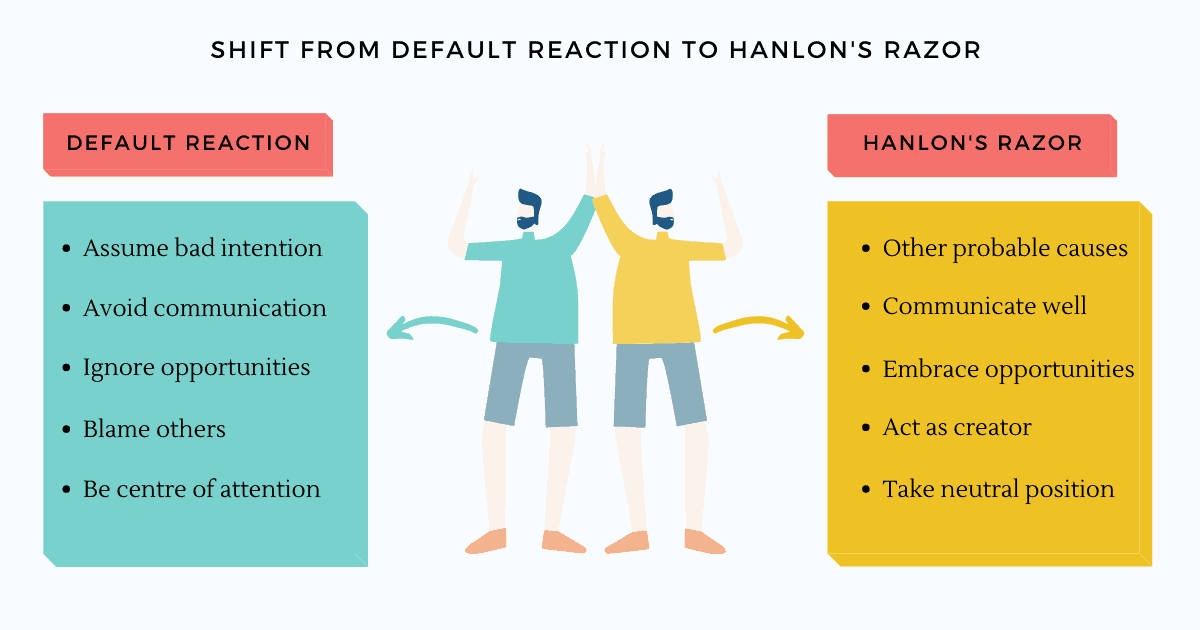
Hanlons Razor - Overview
Hanlons razor is attributed to Robert J. Hanlon who was a computer programmer at the Tobyhanna
Army Depot in Scranton, Pennsylvania. He read “Murphy’s Law” by
Arthur Bloch [1978] and submitted the phrase for inclusion in the follow-up version in 1980.
Variation of this phrase have been in circulation for hundreds of yearsand has been attributed to as diverse a range of people as David Hume, Johann Wolfgang von Goethe, Shakespeare, Ayn Rand, Napolean, and Margaret Thatcher's press secretary Bernard Ingham; however the saying presented in this format is attributed to Robert J. Hanlon.
I am rather drawn to a more comprehensive variation of the razor which was posted in 2009 on the online forum LessWrong:
What is a razor?
In philosophical debate a razor is an abductive rule of thumb or heuristic that infers that unlikely predictions, or explanations, are to be "shaved off" on balance of probability.
Hanlon's razor can be regarded as a social application of Occams Razor which states that: "The best explanation is the one that requires you to make the fewest possible assumptions about what's involved."
Applying Hanlon’s Razor
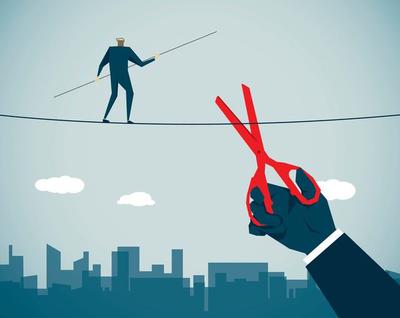
Applying Hanlon’s Razor will check your natural tendency to make an assumption and quickly jump to the wrong conclusion that something your way is the result of an intentional malicious action.
Avoiding wishful thinking
It is human nature to expect that things will always work out as we want them to. But statistically this is very unlikely.
- Successful outcomes are outliers - the exception - rather than the rule.
- Failure is the norm.
In Why Embracing Failure And Uncertainty Is The Better Option we observed that:
"... in the face of this crushing reality, isn’t it odd that we bury failure and deny its existence by refusing to talk about it, rather than being inquisitive and seeking to learn from it?"
Perhaps its not so odd when we consider that our minds are automatically programmed to create what we perceive to be MY life that comes all nicely packaged up with clear boundaries that define my sense of who I am and how things are.
Dealing with "Windows 10"
Think of your ego as your own internal Windows 10. Its role is to control, and it thinks it does (or should) control everything. [Which is of course a major delusion]
How things ought to be
Your ego has a very clear idea of how things ought to be and it is always
craving a credible and coherent story which places you at the centre of
everything. As far as your ego is concerned, you are not only at the
centre of the universe you are the universe.
Correlation and causation
A key part of that story telling mechanism is your ego's innate capacity to associate a connection where there is none, and to find a pattern in events when there is none. Your ego attributes a correlation or causation that just not exist.
Examples
For example, you arrange to meet a business colleague or a friend and they message you at the minute to cancel. More emotively, you have a meeting arranged with your boss and it is unexpectedly canceled just as you are traveling to the office to meet him/her.
In each of these instances the immediate reaction will most likely be to assume some malicious intent: your friend or colleague just couldn't be bothered or had a better offer, your boss just isn't that interested in seeing you...
The more rational and likely explanation in each case is
that there was a very pressing reason for the last minute change of
plans, and it had nothing whatsoever to do with you.
Applying Hanlon's Razor will cause you to take a deep breath, take a step back, and step right out of the story your ego is already creating, and consider the situation from other perspectives and to adopt a more neutral tone while you evaluate the situation.
Cognitive biases and distortions

The default position of your negative thinking patterns reinforce negative emotions and thoughts and, during difficult circumstances, these distorted thoughts can lead to cognitive distortions - which are irrational thought patterns that cause you to to perceive reality inaccurately.
Applying Hanlons Razor will help you to avoid getting caught up in these unhelpful distortions and biases.
Typical examples of this cognitive distortions are:
- Confirmation Bias - Seeing what you want to see, and selecting and acting upon information that confirms your existing beliefs.
- Fundamental Attribution Error - Overemphasizing personal characteristics and ignoring situational factors in judging others’ behaviour.
- Availability Bias - Making decisions based upon your ease and speed of recall of what you think are comparable situations or examples.
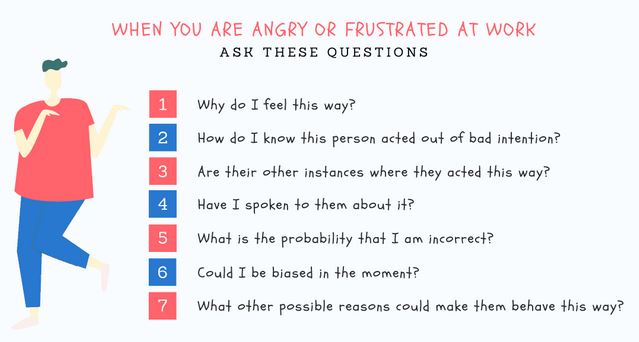
The benefits of applying Hanlons Razor
- Good communication
- Better relationships
- Holistic perspective
The effect of not applying Hanlons Razor
- Negativity
- Overthinking
- Wasting time and energy
Return from "Hanlons Razor" to: Mental Models
LATEST ARTICLES
Staying Committed When You Can't See Progress - The Psychology of Grit
 Uncertainty Is Not The Absence Of Progress, Only The Absence Of Reassurance. One of the most destabilising experiences in modern life is not failure, but uncertainty and staying committed when you can…
Uncertainty Is Not The Absence Of Progress, Only The Absence Of Reassurance. One of the most destabilising experiences in modern life is not failure, but uncertainty and staying committed when you can…The Battle For Your Mind - How To Win Inner Freedom In A Digital Age Of Distraction
 From External Events to Inner Events. We often think of “events” as things that happen out there: the traffic jam, the rude comment, the delayed email reply. But what truly shapes our experience is wh…
From External Events to Inner Events. We often think of “events” as things that happen out there: the traffic jam, the rude comment, the delayed email reply. But what truly shapes our experience is wh…How to See Your Thoughts Without Becoming the Story
 A Practical Guide to Thought-Awareness. You can spend your life inside the stories of your mind without ever learning how to see your thoughts clearly and objectively. Most of the stuff we tell oursel…
A Practical Guide to Thought-Awareness. You can spend your life inside the stories of your mind without ever learning how to see your thoughts clearly and objectively. Most of the stuff we tell oursel…The Collison Decision Matrix - A Simple Framework for Better Choices
 The Collison Decision Matrix Is A Practical Everyday Thinking Tool. Most of us spend a surprising amount of time worrying about decisions. From small ones such as what to wear, what to eat, what to te…
The Collison Decision Matrix Is A Practical Everyday Thinking Tool. Most of us spend a surprising amount of time worrying about decisions. From small ones such as what to wear, what to eat, what to te…The Power Of Asking The Right Question
 The Power Of Asking The Right Question Lies In The Quest For Insight. To experience the power of asking the right question you must develop the practice of asking questions. The best way to improve th…
The Power Of Asking The Right Question Lies In The Quest For Insight. To experience the power of asking the right question you must develop the practice of asking questions. The best way to improve th…Site Pathways
 Here is a site pathway to help new readers of Zen-Tools navigate the material on this site. Each pathway is based around one of the many key themes covered on this site and contain a 150 word introduc…
Here is a site pathway to help new readers of Zen-Tools navigate the material on this site. Each pathway is based around one of the many key themes covered on this site and contain a 150 word introduc…How To Live With Contradiction - Beyond Thought Let Stillness Speak
 A major impact on so many peoples' lives is the situational contradiction of unfilled realistic expectations. So where does all this leave us? Well here we are, with mental equipment that is more lim…
A major impact on so many peoples' lives is the situational contradiction of unfilled realistic expectations. So where does all this leave us? Well here we are, with mental equipment that is more lim…How To Trust The Process Of Mindfulness - Right Now
 In mindfulness, the process isn’t some distant goal — it's what is happening right now. When we talk about how to trust the process of mindfulness the credibility of the process is heavily dependent…
In mindfulness, the process isn’t some distant goal — it's what is happening right now. When we talk about how to trust the process of mindfulness the credibility of the process is heavily dependent…Inner Mastery For Outer Impact - Mental Clarity For Effective Action
 Insights only matter if they translate into consistent action. In a world crowded with quick fixes and motivational soundbites, the theme “Inner Mastery for Outer Impact” calls us to something more e…
Insights only matter if they translate into consistent action. In a world crowded with quick fixes and motivational soundbites, the theme “Inner Mastery for Outer Impact” calls us to something more e…The Wise Advocate - Helping You Achieve The Very Best Outcome
 The focus of your attention in critical moments of choice either builds or restricts your capacity for achieving the best outcome. When we talk of 'The Wise Advocate' its easy to think of the consigl…
The focus of your attention in critical moments of choice either builds or restricts your capacity for achieving the best outcome. When we talk of 'The Wise Advocate' its easy to think of the consigl…Trust The Process - Beyond The Cliche
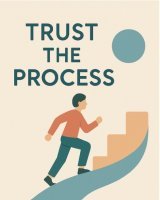 The phrase "trust the process" has become a cliche, the woo-woo mantra of the "self help" industry. Those three little words feel like they ought to mean something useful but hidden behind them are a…
The phrase "trust the process" has become a cliche, the woo-woo mantra of the "self help" industry. Those three little words feel like they ought to mean something useful but hidden behind them are a…The Dopamine Delusion - Why Anticipation Beats Achievement
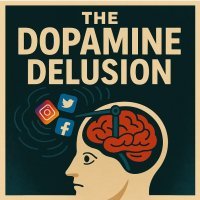 The thrill we feel is not in the having, but in the wanting. The more we have, the more we want. The more things we acquire and the easier things get for us, the more discontent we feel. The more spo…
The thrill we feel is not in the having, but in the wanting. The more we have, the more we want. The more things we acquire and the easier things get for us, the more discontent we feel. The more spo…